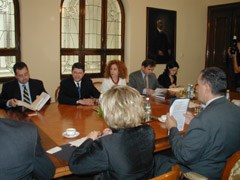- Published: 26.05.2003.
Minister Picula met a group of leading Croatian businessmen and heads of leading Croatian companies...
On Monday, 26 May 2003, Mr. Tonino Picula, the Croatian Foreign Minister met a group of leading Croatian businessmen and heads of leading Croatian companies at the Croatian Foreign Ministry: Mr. Ivica Mudrinić, President of the Management Board of the Croatian Telecommunications, Mr. Željko Čović, President of the Management Board of Pliva, Mr. Rajko Pfaff, Deputy President of the Management Board of Ericsson Nikola Tesla, Mr. Emil Tedeschi, President of the Management Board of Atlantic Group, Mr. Darko Martinac, President of the Management Board of Podravka, Ms Ljerka Puljić, Senior Executive Vice-President of Agrokor, Mr. Franjo Luković, President of the Management Board of Zagrebačka banka and Ms. Lidija Horvatić, Director of International Relations of the Croatian Association of Employers.
The meeting was organised as a preparation for the visit of Croatian businessmen to Brussels to be held in Autumn 2003.
Considering the importance of economic dimension when evaluating the readiness of a particular state for membership in the European Union, constant progress of the Croatian economy has become one of the key arguments for Croatia's readiness to adjust to EU standards. Neutral reports and indicators of success of the Croatian economy in relation to the neighbouring countries and countries in transition in general, are a good basis for such arguments. The evaluation of the situation in the Croatian economy, by distinguished Croatian businessmen , in relations to the EU and the region, and the impact of European reforms to Croatian economy, additionally clarify the circumstances in the Republic of Croatia to EU partners.
 By visiting Brussels, most influential Croatian businessmen will have the opportunity to clarify to officials and civil servants of the European Commission, and representatives of Member States, the application for membership in the EU from the economic point of view: to what extent the application will affect business in Croatia and what changes will the candidature bring to Croatian economy and other sectors.
By visiting Brussels, most influential Croatian businessmen will have the opportunity to clarify to officials and civil servants of the European Commission, and representatives of Member States, the application for membership in the EU from the economic point of view: to what extent the application will affect business in Croatia and what changes will the candidature bring to Croatian economy and other sectors.
This initiative of the Ministry of Foreign Affairs, which was welcomed and accepted by attending businessmen, is to be seen in the wider context of the need for permanent lobbying and continual presence of Croatia in Member States and in the EU institutions. The visit of the Croatian businessmen is even more important as it offers a possibility to other segments of the Croatian society to actively participate in the above mentioned process.



